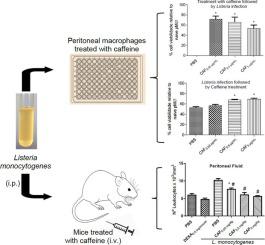International Immunopharmacology ( IF 4.8 ) Pub Date : 2021-09-08 , DOI: 10.1016/j.intimp.2021.108090 Ingrydt de Alcântara Almeida 1 , Betty Mancebo Dorvigny 1 , Lethicia Souza Tavares 1 , Lucas Nunes Santana 1 , Jose Vitor Lima-Filho 1

|
Background
Immunomodulatory therapies are claimed to enhance antimicrobial immunity and counterbalance antimicrobial resistance mechanisms of pathogenic bacteria.
Purpose
To investigate whether caffeine can be useful for control of inflammation derived from experimental systemic infection with Listeria monocytogenes.
Methods
Peritoneal macrophages (pMØ) from Swiss mice were cultured with caffeine in 96-well plates, and then infected with virulent L. monocytogenes 619. In another experiment, the pMØ were first infected with the bacterium and then treated with caffeine. Swiss mice were inoculated intraperitoneally with L. monocytogenes and then treated intravenously with caffeine (0.05; 0.5 or 5 mg/Kg).
Results
Caffeine did not exert direct antibacterial activity in vitro against L. monocytogenes. Macrophages exposed to caffeine before or after infection with L. monocytogenes had increased cell viability, although the intracellular bacterial loads were similar to the control groups. Caffeine treatments of Swiss mice reduced leukocyte infiltration into the peritoneal cavity after L. monocytogenes infection. However, the bacterial burden was reduced in the spleen and liver. The mRNA expressions of IL-1β, IL-6 and the enzyme inducible nitric oxide synthase (iNOS) were reduced whereas IL-10 was increased.
Conclusion
Caffeine has an anti-infectious potential and ameliorated infection-derived inflammation following experimental infection with L. monocytogenes.
中文翻译:

在瑞士小鼠中用毒性单核细胞增生李斯特菌进行实验性攻击后咖啡因(1,3,7-三甲基黄嘌呤)的抗炎活性
背景
据称,免疫调节疗法可增强抗菌免疫并平衡病原菌的抗菌耐药机制。
目的
研究咖啡因是否可用于控制由实验性单核细胞增生李斯特菌全身感染引起的炎症。
方法
来自瑞士小鼠的腹腔巨噬细胞 (pMØ) 在 96 孔板中与咖啡因一起培养,然后用毒性单核细胞增生李斯特菌619 感染。在另一个实验中,pMØ 首先被细菌感染,然后用咖啡因处理。瑞士小鼠腹膜内接种单核细胞增生李斯特菌,然后用咖啡因(0.05;0.5 或 5 mg/Kg)静脉内处理。
结果
咖啡因在体外对单核细胞增生李斯特菌没有直接的抗菌活性。在感染单核细胞增生李斯特菌之前或之后暴露于咖啡因的巨噬细胞增加了细胞活力,尽管细胞内细菌负荷与对照组相似。瑞士小鼠的咖啡因治疗减少了李斯特菌感染后白细胞向腹膜腔的浸润。然而,脾脏和肝脏中的细菌负荷减少了。IL-1β、IL-6和酶诱导型一氧化氮合酶(iNOS)的mRNA表达降低,而IL-10升高。
结论
咖啡因具有抗感染潜力,并在实验性感染单核细胞增生李斯特菌后改善感染源性炎症。











































 京公网安备 11010802027423号
京公网安备 11010802027423号